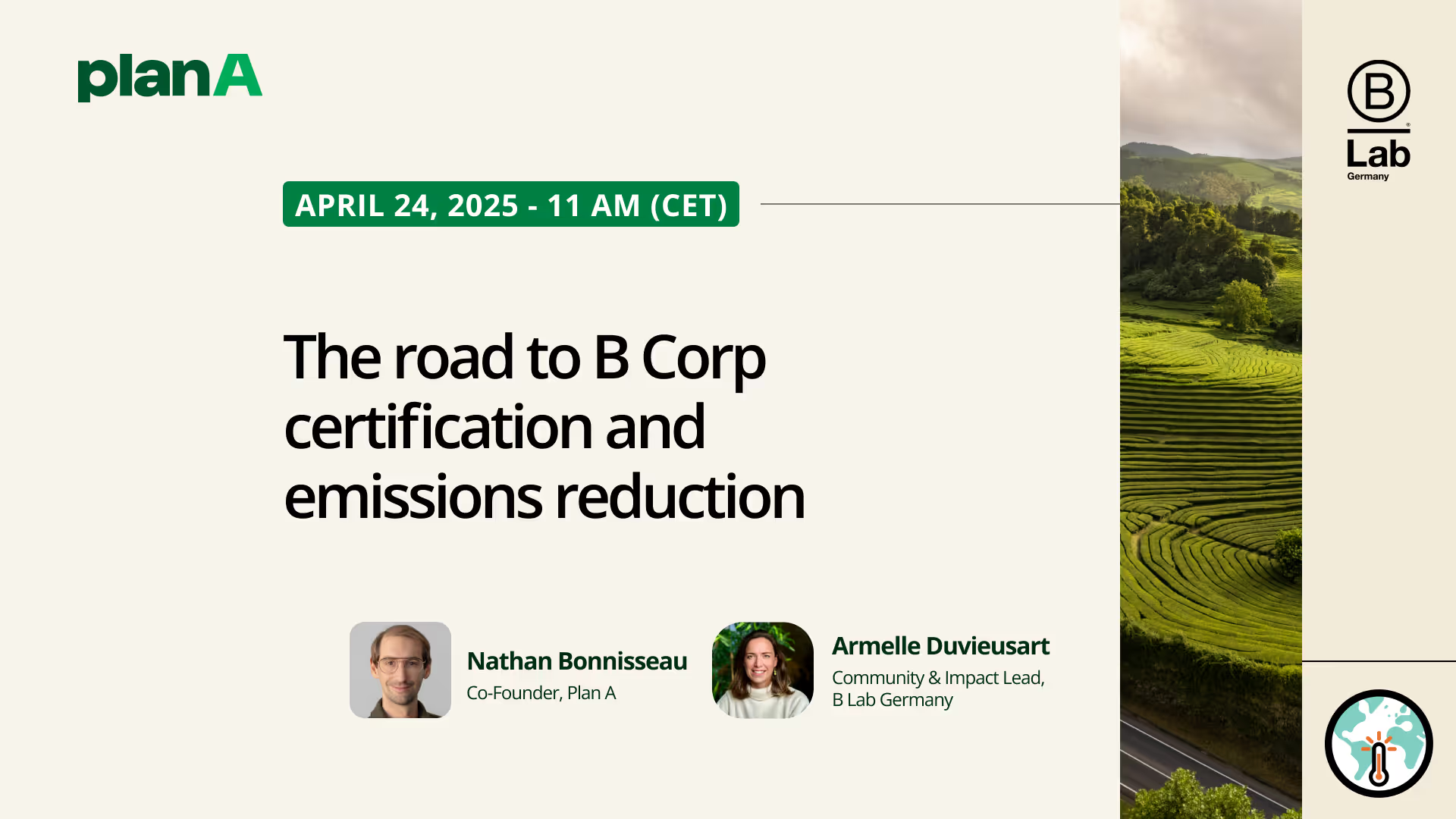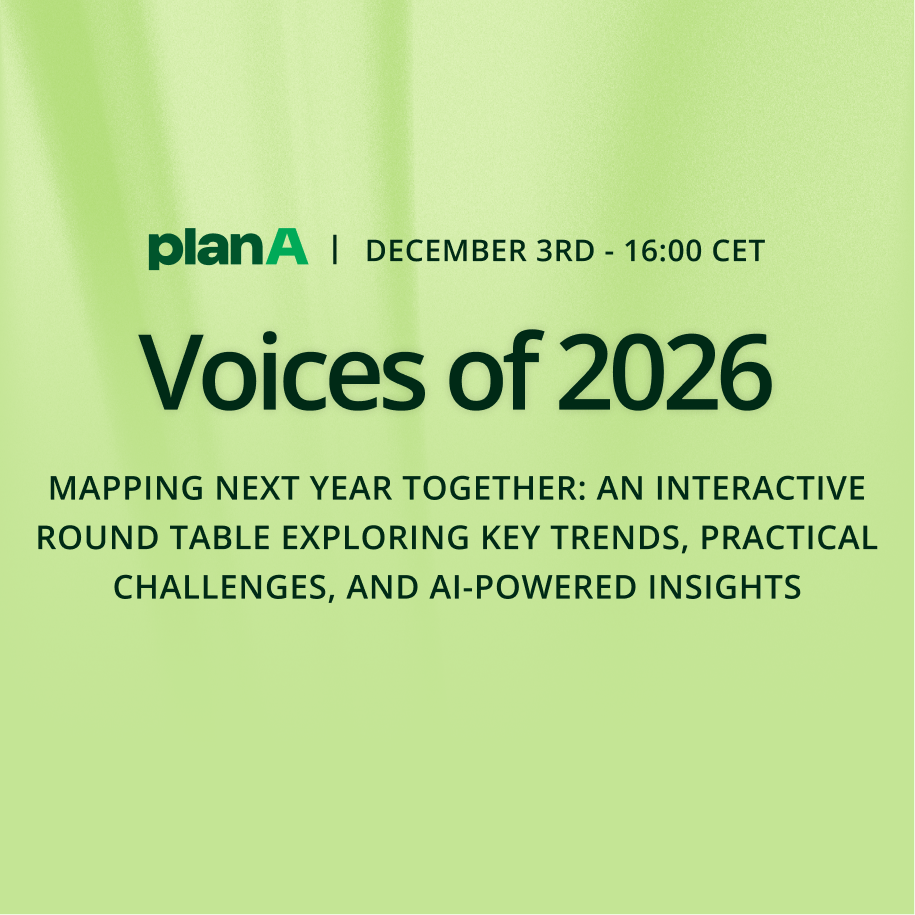Webinar: The road to B Corp and emissions reduction
Hosted by Plan A & B Lab Germany – Abridged Interview transcript
On April 25, 2024, Plan A and B Lab Germany co-hosted a conversation at the intersection of climate accountability and corporate impact. As a leading carbon accounting and decarbonisation platform, Plan A works with hundreds of companies to track and reduce their emissions. B Lab Germany, the steward of the B Corp Certification, empowers businesses to lead with purpose and meet the highest verified standards of social and environmental performance. In this live event, the two organisations unpacked how emissions data and accountability intersect with B Corp recertification, how new standards raise the bar for companies globally, and how better tools and growing policy momentum are creating an inflection point for real progress.
Plan A Co-Founder Nathan Bonnisseau spoke with Armelle Duvieusart, B Lab Germany’s Community and Impact Lead, about what these changes mean for companies, how to start the journey, and why businesses must evolve in tandem with rising stakeholder expectations. The following is an abridged version of this conversation. You can find the full recording of the webinar below.
Deciding to certify
Nathan Bonnisseau:
Plan A was certified as a B Corp back in 2021, and that was a big milestone for us because it was like looking in the mirror. We had been helping our clients understand the impact of their businesses from the environmental side—and then we got to ask, what is our own impact?
That process really changed us. The impact assessment helped us realize where we had strong practices in place and where we had work to do. And now we’re in recertification—so we’re experiencing how that bar is being raised.
Armelle Duvieusart:
Yeah, and I love what you said: it's a mirror. And what’s beautiful about the assessment is that you don’t need to be perfect to become certified. You just need to commit to doing better. It’s not a one-time thing. You can join with the standards that exist today, and you have the time and tools to improve over the years.
And this is a key point for us at B Lab: it’s not about saying, “I’ve arrived,” it’s about saying, “I’m going in the right direction.”
The new B Corp standards: “Raising the bar is raising the impact.”
AD:
We are going through the biggest change ever in our standards. So far, the B Corp Certification was based on a point system—200 questions, and you needed 80 points. That allowed you to become certified in different ways.
What we realized is that this didn’t always lead to the best outcomes. Some companies were excelling in one area but didn’t meet a baseline in others. The new standards define a minimum requirement in seven core topics that every B Corp must meet. This shift raises the bar.
NB:
It’s a transition from a modular “choose-your-own-path” system to one that really codifies what a good company looks like across the board. And it’s great to see that because many companies we work with are asking: “What does good look like?” Now they’re getting clearer answers.
AD:
Yes, exactly. Companies will now be assessed on things like climate action, human rights, worker engagement, governance, and risk standards. And they need to meet a minimum threshold in all those areas—not just a few.
It’s more ambitious, but also more powerful. Because raising the bar is raising the impact.
Climate Action as a core requirement
NB:
One of those seven topics is climate. And that’s where our work as Plan A intersects really strongly with B Lab. At Plan A, we help companies calculate emissions, plan decarbonisation strategies, and track progress over time. And what’s really clear to us is that this only works if the business is willing to make real changes—just like in the B Corp model.
AD:
Yes, and in the new standards, climate action is not optional. For example, larger companies—those with over 250 employees or more than €75M in revenue—are expected to disclose Scope 1, 2, and 3 emissions and have a reduction plan aligned with science-based targets within three years of certification.
Read also: How sustainability drives value
NB:
That’s a big step, but a necessary one. Scope 3 especially can be daunting for companies. It involves your whole supply chain, your purchased goods, your business travel. But as we say at Plan A, you can’t reduce what you don’t measure.
We often hear from companies, “We want to improve,” but they’re stuck in Excel spreadsheets or rough estimates. That’s where software and reliable methodologies come in. You need traceability. You need to be audit-ready.
Who owns the journey? everyone.
NB:
Something we talk about a lot with clients is, “Who owns this internally?” Because if sustainability is owned by a single junior person with no budget or influence, nothing moves. But when leadership is involved—and when it’s treated like a core business function—it creates momentum.
AD:
Exactly. We encourage companies to involve leadership from the beginning. And what we also see in our community is that people want to help each other. There’s a strong peer network, and many certified companies become advocates and mentors.
The role of size and maturity
AD:
We’ve also built in size-appropriate expectations. Smaller companies won’t be expected to do everything all at once. For them, having a credible plan in place from the start is enough. But larger companies, or those that grow during the certification period, need to scale their practices accordingly.
NB:
That’s a really good design choice. Because we’ve seen small teams do amazing work—and we’ve seen large companies struggle to get buy-in across departments. It’s not just about resources, it’s about willpower and clarity.
Interoperability: not another framework
NB:
One of the biggest pain points we see in the market is framework fatigue. There’s CSRD, GHG Protocol, CDP, SBTi, ESRS… Companies ask us, “Do we need to do all of them?” And what we’ve tried to build at Plan A is interoperability. One source of data, many outputs.
AD:
Yes, and in our standards redesign, we’ve kept that in mind. We are aligning more closely with global frameworks like GRI and CDP to ensure companies can streamline their reporting. If they’re already reporting to one framework, they won’t need to start from scratch.
NB:
It’s also about trust. If you can show investors, auditors, and your own team that your carbon data is verifiable, aligned with science, and comparable across frameworks—that’s a big win.
AD:
We always tell companies: just start by opening the B Impact Assessment. It’s free. You can explore the questions, and it immediately shows you where you stand. That in itself is already a valuable learning process.
NB:
I couldn’t agree more. And I think many companies get stuck in the idea that they need to “do sustainability perfectly” from the beginning. But really, you need to start. Then you get feedback. Then you improve.
Cutting time-to-action
NB:
The other thing is, reporting alone won’t solve anything. You can report your emissions and still not take action. That’s why we always work with companies to turn insights into strategies—setting reduction targets, embedding climate into operations, educating teams.
AD:
And that’s where B Corp also adds value. It’s not just about disclosing. It’s about embedding practices across the company—from the boardroom to the employee level.

AD:
What’s unique about B Corp is the community aspect. We’re not just certifying companies and sending them off. We’re inviting them into a network of like-minded businesses. We have onboarding calls, peer exchanges, knowledge sessions, and ongoing support.
NB:
Yeah, we’ve definitely felt that. Whether it’s learning from others, sharing tools, or just knowing you’re not alone—it’s incredibly motivating.
Looking ahead: policy, tech, and momentum
NB:
One thing I see in sustainability that’s different from other fields is the fear of failure. In product, you test something, it doesn’t work, you iterate. But in sustainability, there’s a kind of moral weight—like if your emissions go up one year, you’ve failed as a company. That can stop people from being transparent.
AD:
Exactly. And that’s a problem. Because we need transparency. We need companies to say, “We tried this, it didn’t work, here’s what we’re learning.” That’s how progress happens.
NB:
That’s why I think this movement needs to embrace humility and experimentation. No one has all the answers. But together, we can build better ones.
AD:
We’re seeing policies evolve too—CSRD, supply chain laws, carbon pricing. That’s putting pressure on companies, but also creating momentum.
NB:
Yes, and as the bar rises, so do the tools. Carbon accounting platforms are improving, sustainability teams are growing, and people are realizing that this isn’t just about risk—it’s about value. Companies that get this right will be ahead.
AD:
We’re raising the bar because the world demands it. And we want every company, big or small, to know: you can do this. You’re not alone and communities help.
NB:
And whether you’re doing your first emissions assessment or your second B Corp recertification—just start. Use the tools. Talk to the community. Take the next step.
Want to join the conversation and stay ahead on sustainable business practices?
🔔 Subscribe to Plan A’s updates for invites to events, resources, and insights
🔗 Follow Plan A on LinkedIn
📩 Sign up with B Lab Germany to start your certification journey.




.jpg)


.webp)
